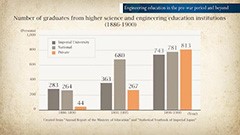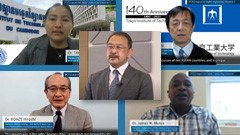Engineering education supported the development of technologies and industries in Japan

Monument to the Imperial College of Engineering, laid the foundation for independent technical education in Japan, enabling engineer education by the Japanese, in Japanese.
Japan is currently home to some of the world's top technologies. Looking back on the process of Japan establishing modern industry and achieving the development of society and economy as a science and technology-based nation, JICA-Net multimedia-based learning materials, "Engineering Education in Japan: the Foundation of Japan's STI and Industrial Development" (YouTube, external link) overview Japan's experience and shows how much the development of human resources to society by engineering education has contributed to strengthening the ability of technology development in this country.
Specifically, we produced the material to explain how the Japanese government and universities have enhanced engineering education and research, and how they have provided the human resources and developed the technologies needed by industry and academia. Moreover, the material intends to deepen the understanding of those who are involved in higher education including governments and universities in developing countries, and also to be used as a reference for the development of higher education in developing countries.
Introduce the history of Japan's engineering education and JICA's cooperation with developing countries easily
In the first part, using many historical pictures, illustrations and data, the material easily explains the history of Japan's higher education in engineering which has achieved rapid modern industrialization. Japan's technologies and industries were supported by higher education in engineering, which produced outstanding industrial human resources.
Although the beginning of Japan's modern industrialization was comparatively behind Europe, Japan incorporated knowledge learned from overseas (ex. Foreign advisors hired by the Japanese government in Meiji Era) and adapted them to Japan. That is why Japan succeeded in the training of highly skilled industrial personnel.

the material easily explains the history of Japan's higher education in engineering with many historical pictures, illustrations and data.
The second part, based on the history of the development of Japan's higher education in engineering seen in the first part, introduces some examples of JICA's higher education projects in developing countries.
By utilizing Japan's experiences of introducing technologies from Western countries and producing higher industrial human resources, JICA has been supporting universities and higher education organizations in various countries and regions including Asia and Africa over many years. JICA emphasizes research, experiments, and practices rather than classroom lectures, which is the strategy implemented in Japan's higher engineering education.

The material includes many interviews with the experts and people involved in JICA's projects. The viewers are able to know the characteristics of each project and the efforts for the development of engineering education in developing countries by those local voices.
The material includes the following interviews: Dr. WATANABE Koichiro (Senior Advisor, JICA / Professor Emeritus of Kyushu University), Dr. KOKAZE Hiroshi (Chief Advisor / Professor Emeritus of Obihiro University of Agriculture and Veterinary Medicine) and Dr. James M. Mutua (Lecturer, Department of Mechanical Engineering, Jomo Kenyatta University of Agriculture and Technology (JKUAIT), where the project is implemented) from AFRICA-ai-JAPAN Project: JKUAT AND PAUSTI Network Project, which is implemented in Kenya. Dr. TAN Reasmey (Deputy Director of Research and Innovation Center
Institute of Technology of Cambodia), and Dr. TAKADA Jun-ichi (Professor at the School of Environment and Society, Tokyo Institute of Technology) from ASEAN University Network / Southeast Asia Engineering Education Development Network(AUN/SEED-Net)Project Phase4.
The viewers are able to know the characteristics of each project and the efforts for the development of engineering education in developing countries by those local voices.
For the development of technologies and industries in developing countries through building the foundation of engineering education
We intend that the material specially could be used in JICA projects, training and lectures in universities that are receiving teachers and students in developing countries, and also as a self-learning material before training and lectures.
Moreover, it could be used in classes of international cooperation, higher education, and engineering areas in domestic universities.
Specifically, we plan to use the material for leading universities of developing countries that are supported by JICA's global agenda for education, "The cluster of strengthening leading universities", as well as to use for JICA Development Studies Program (JICA-DSP).
800-1,000 new JICA international students visit Japan every year and there are always 2,000 students in Japan. We target some of them, who are administrators and professors in the engineering area in universities where JICA-DSP is performed.
Even now, through JICA's technical cooperation projects, those who learned Japan's engineering education are working in their respective countries and regions. We expect that Japan's experience would be introduced widely by the material both nationally and internationally, and contribute to the development of human resources, technologies, and industries in developing countries.
JICA Human Development Department
(Educational Knowledge Management Network Task Team
"Engineering Education in Japan: the Foundation of Japan's STI and Industrial Development")
*The Material(s) mainly applied
Engineering Education in Japan: the Foundation of Japan's STI and Industrial Development
Japan is currently home to some of the world's top technologies. Japan's technologies and industries were supported by higher education in engineering, which produced outstanding industrial human resources. The first part will review the history of engineering education in Japan, and the second part will introduce the propagation and use of engineering education in making Japan an industrializing nation (introduction of JICA's higher education project) . This material is formulated for the JICA participants to introduce how Japanese government and universities have enhanced engineering education and research, and how they have nurtured and provided the human resources and developed the technologies needed by industry and academia both in Japan and abroad.
Supervisor: Educational Knowledge Management Network




scroll